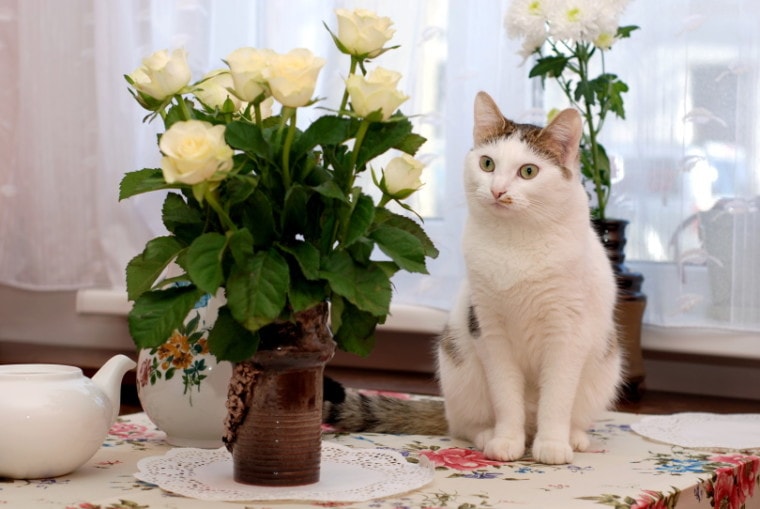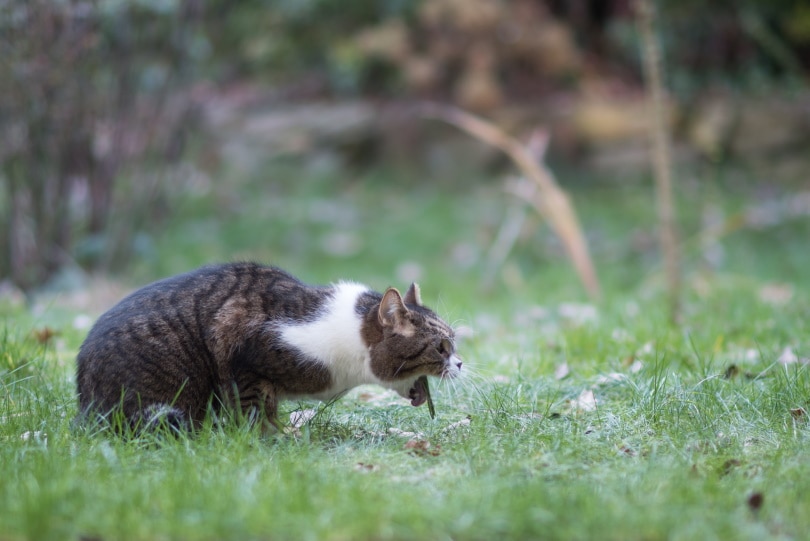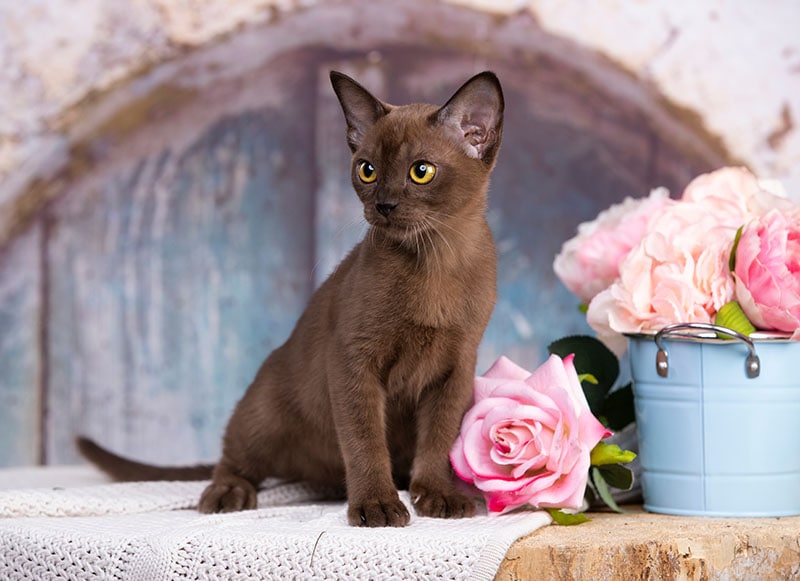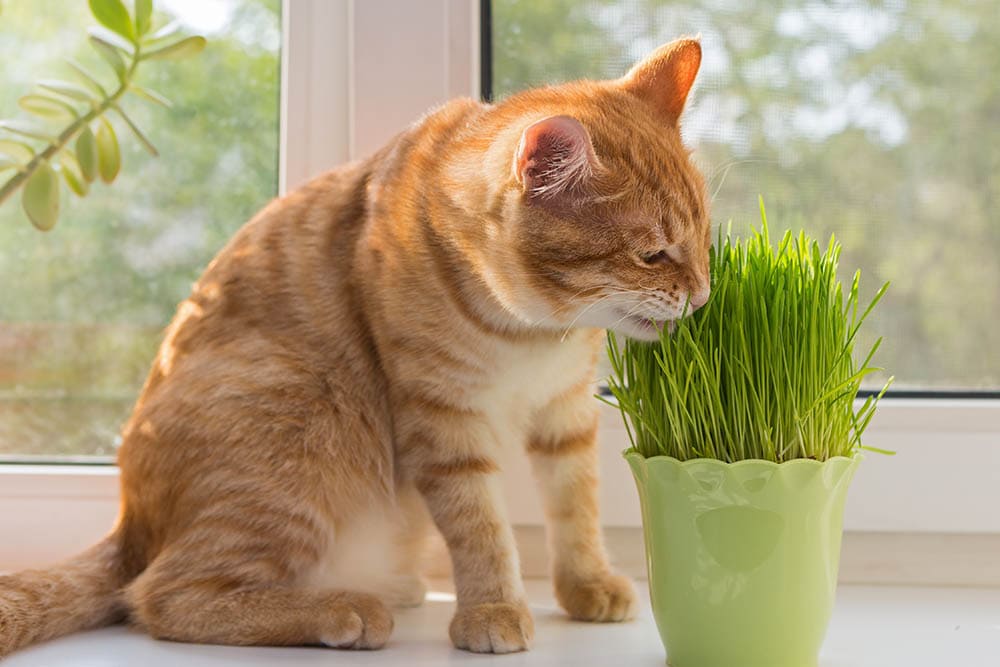
If you’re familiar with cats, you’ve probably experienced their tendency to nibble on the plants that you have in your house or garden. Unfortunately, this includes plants that cats really shouldn’t be eating, such as the prized rose bush that you’ve struggled to keep alive. Fortunately, roses alone aren’t toxic to cats, though there are several plants with “rose” in the name that are toxic.
While roses themselves aren’t toxic, they can be harmful under certain circumstances. Cats aren’t made to eat plants, and ingesting even harmless flowers can result in an upset tummy.
This reaction is mild and will only make your feline feel sorry for themselves for a while. That said, there are a few ways that roses can cause more severe consequences. We put together this guide to answer any questions that you may have about roses and cats.
What Makes Roses Harmful to Cats?
The most obvious reason that roses are harmful to cats is the thorns. To the unsuspecting feline or human, a rose’s thorns can leave nasty scratches. Cats handle things with their paws and mouth, and any thorns that they try to paw or bite stand a good chance of retaliating.
Added chemicals are the second reason that roses can be harmful to cats. Roses can be difficult to grow, especially with insects eating away at the leaves, and it’s easier to rely on pesticides to rid your garden of these nasty flower-eating critters.
Unfortunately, pesticides—and other sprays that you might use on your roses—don’t distinguish between pests and your cat. As your feline munches on your flowers, they’re also ingesting the pesticides that you’ve used to help your roses grow.
Pesticide poisoning has obvious signs to look out for. If your cat is a known flower eater and shows any of these signs, make sure to immediately visit your veterinarian:

A Rose By Any Other Name
While ordinary roses are harmless to cats, the same can’t be said for other plants with “rose” in the name. You might not have any of these in your garden, but just in case, here are a few to remember:
What Flowers Are Toxic to Cats?
There are several varieties of flowers without “rose” in their name that are toxic to cats. This list doesn’t cover all the poisonous plants to watch out for, but these are a few of the more popular species:
If you have these plants at home and aren’t sure whether your cat has taken a few bites, here are a few signs of plant poisoning to look out for before visiting your veterinarian:

What Flowers Are Not Toxic to Cats?
If you have a cat that’s particularly fond of munching on your flowers, it’s a good idea to make sure your indoor garden is as harmless to your feline as possible. Alongside roses, many other flowers are harmless and can still brighten your home:
Common lilacs are also not toxic to cats, but like with roses, there are flowers with a similar name that are toxic to cats. It’s always better to play it safe, and if you’re not sure about a plant, ask your veterinarian.

The 4 Tips for Stopping Cats from Eating Your Flowers
Cats are well known for their stubbornness and tendency to do whatever they want. Yelling at them for eating your favorite flowers is only going to get you a slow, innocent blink and a cheerful tail flick. Fortunately, there are ways to gently persuade your favorite feline to not eat your plants. These options are subtle enough that your cat won’t realize that they are being trained!
1. Sprays
Many pet shops have sprays available that are designed to make plants unappealing to cats. Strong citrus smells, in particular, fend off curious felines, and you can make a homemade spray by diluting lemon, lime, or orange juice.

2. Keep Plants Out of Reach
Keeping plants on a shelf is fine until you realize that your cat can still reach them. Said plant is probably one of the reasons that your feline loves that obscure shelf in the corner of the room so much.
Hanging baskets are a good way to keep your cats out of your plant pots. Make sure to hang them high enough and away from anything that cats can climb on.
Be mindful, though; you may think that making your toxic plant inaccessible to your cat saves them from any ill effects. However, pollen can be poisonous to your feline too. Depending on how toxic the plant is, your cat licking fallen pollen off their fur can have just as many devastating effects as eating the plant itself.
3. Cat Grass
This may seem counterintuitive because you’ll be encouraging your cat to eat one plant over another. But giving them a cat-safe and edible garden may just draw their attention away from your flowers while convincing them not to figure out a way past any citrusy smells or hard-to-reach places.

4. Training
With time and plenty of patience, it is possible to train your cat to leave your plants alone. Through consistency and positive reinforcement, like food or friendly scratches, you can direct your feline’s attention to more interesting and acceptable things.
The key here is to find what your cat loves the most and use it to your advantage.
Summary
On their own, roses aren’t toxic to cats, provided that you don’t use pesticides. This means you can keep your favorite rose bush and not have to worry about your cat poisoning themselves.
There are varieties of roses that are toxic to our feline best friends. The Christmas Rose and Rose of Sharon are two examples. Potentially toxic plants don’t only include flowers with “rose” in the name, however, and there are several other plant species that you should keep away from your cat just in case, such as daffodils and oleander.
If you’d prefer that they didn’t eat your plants at all, you’ll have to train them to stay away.
See also:
- Are Birds of Paradise Toxic to Cats? Vet Approved Facts & Safety Guide
- Can Cats Eat Dandelion Greens? What You Need To Know!
Featured Image Credit: Nadinelle, Shutterstock







